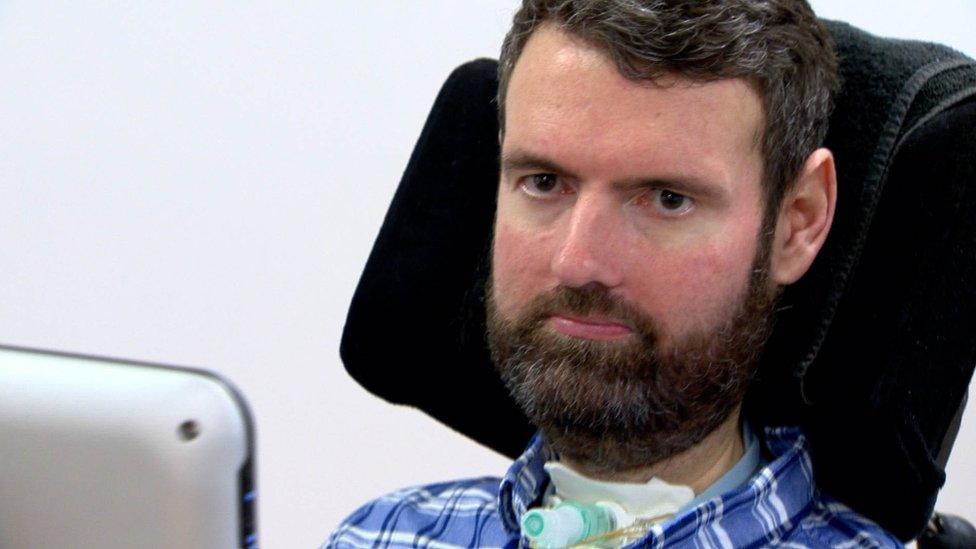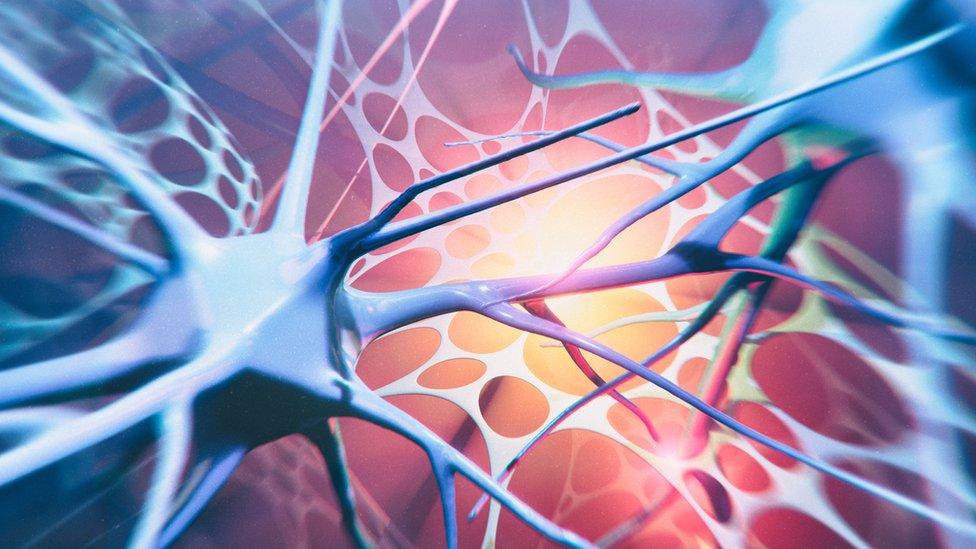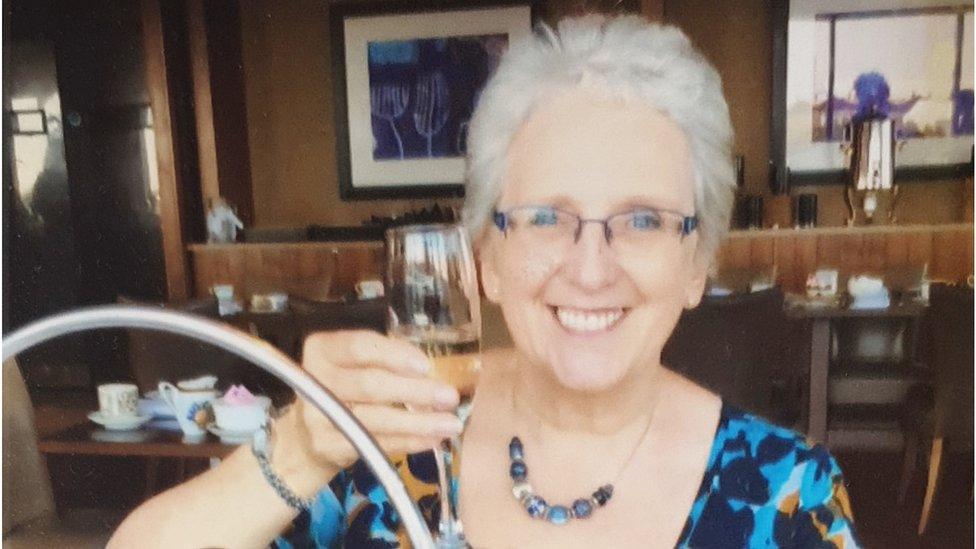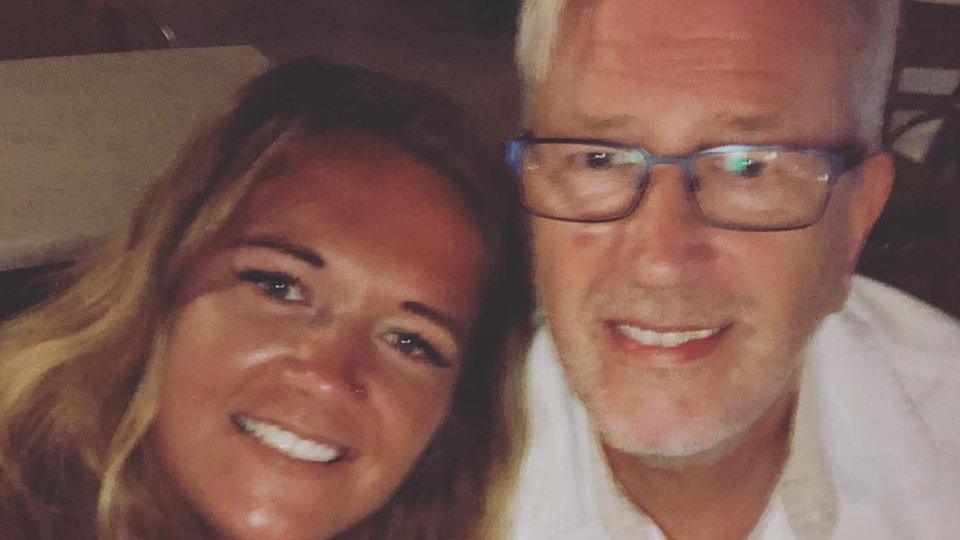MND: The search for new treatments
- Published
Alan can no longer walk after being diagnosed with motor neurone disease in 2017
It's been described as one of the few remaining illnesses that is still largely a mystery - and yet it claims hundreds of lives in the UK each year.
Motor neurone disease (MND) sees muscles waste away after a loss of nerve cells that control movement, speech and breathing.
There is no effective treatment or cure and half of the 1,500 people diagnosed each year die within 24 months.
But now, the largest clinical trial in a generation, led by a team of researchers based in Edinburgh, may offer some hope.
It will test potential new treatments for MND as well as looking at whether existing treatments for other conditions could have some benefit.
These are the stories of some of those involved.
The patient
Alan Gray is excited by the prospect of the trial.
A manager in IT with three grown-up children, Alan was diagnosed with MND in January 2017, when he was 54.
The early symptoms were innocuous enough - he kept clipping the pavement as he walked, as though his foot had dropped.
Three years on, Alan can no longer walk.
And his home, in Denny, Stirlingshire, has had to be specially adapted for him.
Alan admits the diagnosis was devastating but he remains relentlessly optimistic.
"Initially I looked at it all and it's just too overwhelming," he says.
"So you have to come back and say, 'Right - where are we today? What's the plan for tomorrow?' and maybe look a little bit ahead.
"I go to the gym three times a week, I get massage therapy regularly to keep the body moving, follow the physio guidance.
"Energy is a real problem because the muscles are weaker, so I have to try and manage my energy each day.
"We'll do one thing, maybe two things but not anything more."
Alan has survived so long he is no longer eligible for most clinical trials.
But this new project, known as MND-Smart, external, is different - and Alan is going to be part of it.
"Hope is something that's a real positive," he says. "With having a trial now, we can see something that we can get some hope and strength from.
"As participants, we can help move science forward."

What is the new trial?
At present there is only one treatment for MND that can extend life for two or three months.
The new clinical trial will allow hundreds of people living with MND in the UK to take part in tests of potential treatments.
While most trials focus on a single drug or treatment, the MND-Smart trial will test several at the same time.
Patients taking different treatments will be compared with a single group who receive a dummy drug called a placebo.
They are more likely to receive an active treatment but the trial is also designed to be flexible so researchers can change the drugs being tested as results emerge.
New drugs can be added and medicines that are not effective can be dropped.
It's an approach that has not been used before in MND research anywhere in the world.
They will test new drugs but also medications already licensed for other conditions, such as Alzheimer's disease or anxiety and depression.
Repurposing drugs like this can dramatically speed up the time it takes for effective treatments to become more widely available.

The fundraiser

Euan MacDonald is one of the longest living people with MND
The trial has been developed by people with MND working with clinical-trial experts from across the UK, including University College London, the University of Warwick - and the Euan MacDonald Centre for MND Research, at the University of Edinburgh.
The man the centre was named after was working as an investment banker in London when he was diagnosed with MND, in October 2003.
Now, Mr MacDonald is one of the people who have lived longest with MND, and he has used that time to raise money as well as awareness of the disease.
Like Stephen Hawking, another famously long-lived MND survivor, he uses a voice synthesiser to speak.
His enthusiasm for the new project being developed by the centre that carries his name is obvious, particularly the hope offered by repurposing existing drugs.
He says: "We're all impatient to see results from the research that's happening.
"There are no guarantees but repurposing has worked for other conditions like cancer.
"Crucially, the drugs have already been approved as safe to use, so the process is shorter.
"Time is of the essence, so anything that can speed up the research process is very welcome."
The doctor
Dr Pal will be overseeing the MND-SMART trial
For those doctors, nurses and bio-medical researchers who specialise in MND, the illness must at times feel like a frustrating target.
About 5,000 people are living with MND in the UK today - but with long term survival rates so low, there is a limited window in which to study why it develops and how it progresses.
Consultant neurologist Dr Suvankar Pal works at Edinburgh University's Anne Rowling Regenerative Neurology Clinic, founded by the author J K Rowling in memory of her mother.
Dr Pal, who will be overseeing the MND-Smart trial, admits it has been a challenge to find effective treatments up until now.
"That's partly because the mechanism by which the brain cells don't work properly isn't fully understood," he says.
"And this condition progresses very quickly, so actually trying to encourage people to participate in trials and following them through until later stages of the illness is very difficult."
Dr Pal says other studies have also been hampered by having too few people involved, meaning it has not been possible to obtain meaningful results.
But the new study offers new hope.
"There here has been a lack of progress so far with discovering new therapies for motor neurone disease and I think anything that we can do to improve the quality of life and the survival of people with MND is a step forward for this condition," he says.
Making memories
Back in Denny, Alan Gray is sitting up at the breakfast bar in his kitchen with his wife, Beverley.
Alan and Beverley have been focusing on making memories that will last - taking 10 holidays in the year after Alan's diagnosis.
He says: "I'm quite a strong-willed person. I've got a lot of family and friends and support, so that all helps.
"But I've also got a kind of mental toughness anyway to say, 'You know, there's no point of just kind of saying, 'Well, why me?' or any kind of denial.'
"This is the reality. So let's find something positive to do, move forward, one step at a time."
- Published18 December 2019

- Published22 June 2019

- Published9 November 2019
